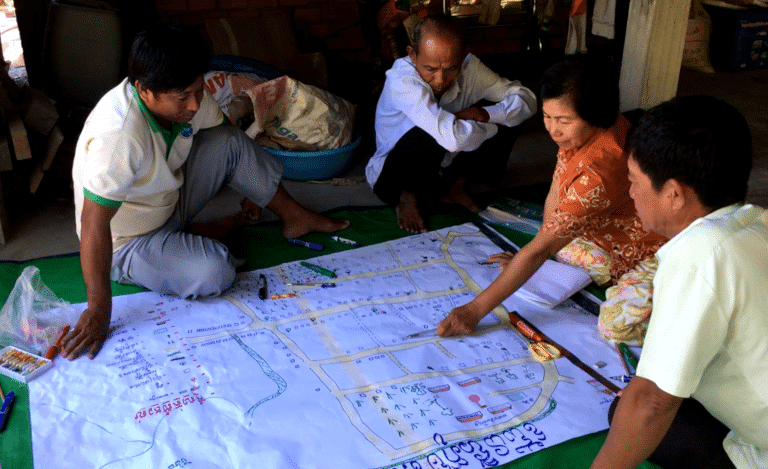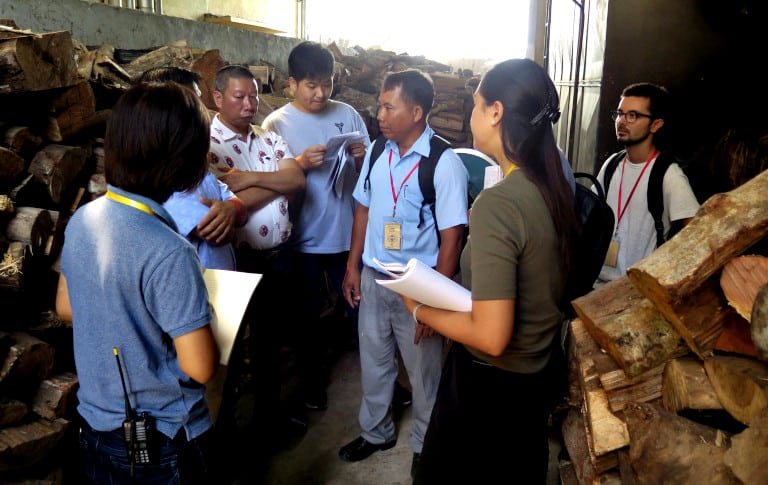Forest communities engaged in the energy transition in Cambodia
Cambodia has the sad record of the highest rate of deforestation in Southeast Asia. In the province of Kampong Chnang, we work both with local forest communitues and industries to change this.
Biomass is the main source of energy in Cambodia. Coal is used both by households for domestic cooking and by the textile and food industries. The conversion of forest areas into agricultural areas has long been successful in meeting this high demand. However, this massive deforestation also now affects protected forests and is not a sustainable solution for the country. Forest ecosystems are also heavily impacted by extreme weather events such as droughts and floods, to which Cambodia is particularly vulnerable [1].
In response to the environmental problem and socio-economic issues in Cambodia, Geres is working on the development of a sustainable biomass energy sector. In Kampong Chnang province, on the outskirts of the Cardamom Mountains, we work with both local forest communities and industrialists, the main consumers of wood energy [2].
A response to the challenges of forest communities
During a visit to Anlong Svay Community Protected Area [3] (CPA) in Kampong Chhnang Province, its President Nut Hang, engaged in the protection of the forest, witnessed the situation they face “In places, the forest has receded and there is only bamboo left. We need to plant trees and restore the forest in these buffer zones between the villagers’ lands and the protected forest.”
Nut Hang is one of the representatives of the local authorities accompanied by Geres. He has benefited from training to gain a better understanding of the climatic phenomena impacting his territory, to define a development plan for the restoration of forest ecosystems and to learn how to sustainably manage the natural resources of his community.

APC members are mostly poor and improving their families’ living conditions remains their number one priority, as Nut Hang explains: “Most people in our community are unemployed at the end of the rice harvest. That’s why some people will cut trees in the forest and sell the wood to provide for their families. ”
The forest plays a major role in the socio-economic development of the country and provides essential resources for the most vulnerable households. However, communities are often badly informed about the potential benefits of these protected areas, which means these highly degraded areas are left in the hands of unscrupulous actors. A development plan must therefore also find a sustainable response to the demand for wood energy.
Establishing community nurseries and commercial plantations at the buffer zone level is an option that could provide long-term value-added products to local communities. The sale of buffer wood could then fund patrol activities to protect forests.
Engaging the private sector
These forest communities are close to many textile factories, heavily consuming wood energy. Geres is working with around 30 factories supplying H&M in Cambodia to raise awareness of the limits of unsustainable wood energy consumption in the industry and to promote a transition towards sustainable supply that benefits communities.
Find out more

To go further
Geres programs in Cambodia are supported by many private and public partners. If you also wish to contribute to the development of a sustainable biomass energy sector in Cambodia, do not hesitate to contact the sponsorship team.
For more information, you can visit our page dedicated to our actions in Cambodia.
The interview with Nut Hang was conducted by Maisam Math, Project Officer for “Adaptation to climate change “, and translated by Léa Watine, Partnership Officer at Geres.
[1] Cambodia is ranked 12th in the “extreme risk” category by Maplecrof’s 2015 vulnerability index to climate change.
[2] Wood energy is the wood used to produce fire, whether to heat, light, cook or produce electricity. This source of energy comes from biomass. It is therefore renewable and carbon neutral, provided that the wood is used sustainably.
[3] APCs are a mode of management delegated to local communities. These areas are divided into several zones, some allowing sustainable exploitation of forests, others being dedicated to conservation. APCs are managed by a management committee, representing all villages in the area and elected by APC members.
WOULD YOU LIKE TO TAKE ACTION
AND SUPPORT WHAT WE DO?
Tell us who you are and find your means of action.
